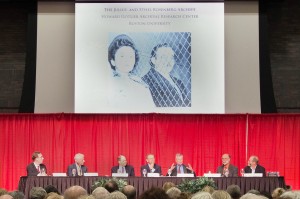
Experts and Boston University professors convened Thursday at BU’s George Sherman Union Metcalf Ballroom to speak with a crowd of hundreds about espionage in the United States and to showcase a collection of letters and artifacts, a section of the Howard Gotlieb Archival Research Center Friends Speaker Series.
The panel examined two of the most famous espionage cases in America: Ethel and Julius Rosenberg, accused of sending top-secret information about the atomic bomb to the former Soviet Union and charged with conspiracy to commit espionage, and Edward Snowden, a former National Security Agency subcontractor who leaked confidential information about the NSA’s illegitimate activity.
“Both [the Rosenbergs and Snowden] are saying there are higher ideals than our laws,” said Robert Meeropol, a panelist. “They were going to make their mark on the world.”
The panel consisted of Robert and Michael Meeropol, the sons of the Rosenbergs, BU international relations professor Joseph Wippl, Newsweek journalist Jonathan Alter, BU professor of central European history Igor Lukes and New York Times journalist Stephen Kinzer.
The Meeropol brothers opened the panel, during which Michael recalled time spent with his parents and their various family excursions, such as riding in the first car of the train with his father and being “allowed to look out the window.”
“They saw the failures of capitalism first hand and grew to believe that the Soviet Union, with its economy and full employment, represented a better future,” he said. “Public opinion saw them as traitors.”
The brothers explained that the case was reopened when a variety of unique correspondences provided by their parents’ lawyer were found in a meat locker after 20 years.
“There is no other correspondence in the history of the world between two condemned people who are husband and wife, who were then executed,” he said. “People asked us, ‘what happens if there is material that shows that your parents are guilty?’ We said, ‘The truth is more important than our opinion.’”
The panel concluded that the execution of Julius and Ethel Rosenberg was an egregious act of desperation on behalf of the United States to appear strong against what was suspected of being a communist threat.
“[Former U.S. President Dwight D.] Eisenhower accepted that communists would control a part of Korea, so Eisenhower’s first big decision [was] to accept the idea that communists should control a part of Korea,” Kinzer said. “One of the things that he could do, in his mind, was that he could accept the execution of the Rosenbergs.”
The panelists noted that the country is split in its opinion of Snowden, with some viewing him as a hero and others as a traitor.
Wippl began the discussion on Snowden, stating that the NSA has the capability to spy on United States citizens, but cannot possibly monitor all of this information.
“Years ago — before Snowden — I asked my students, what is the motto of the United States? … They would say ‘In God We Trust,’ and I would say, that’s right, and everybody else, we monitor,” he said. “There are very complicated issues of law.”
The question of Snowden’s guilt remained a point of debate between the panelists, but none believed that the death penalty would be a proper treatment for his crimes.
“Snowden himself — I mean — you’ve got to feel sorry for the guy. He’s in Moscow, being protected by someone who invades other countries,” Wippl said. “That in itself, so to speak, has ruined his credibility.”
Attendees of the panel said they found it enlightening and incredibly interesting. However, they, much like the panelists, remained divided on the idea of Snowden’s supposed crimes.
Christina Lucas, a sophomore in the College of Arts and Sciences, said she believes the NSA has a right to protect the United States through spying.
“I don’t think they’re trying to harm us, [but] I think he [Snowden] should be punished,” she said. “If he wanted to be the hero, he was putting us in jeopardy.”
Connor Beck, a sophomore in the College of Engineering, said he does not see any harm in what the NSA was accused of doing.
“Whistleblowing within a corporation is different than releasing private information from the government,” he said. “I don’t think they [the NSA] really care. I don’t think they’re trying to harm us.”























































































































